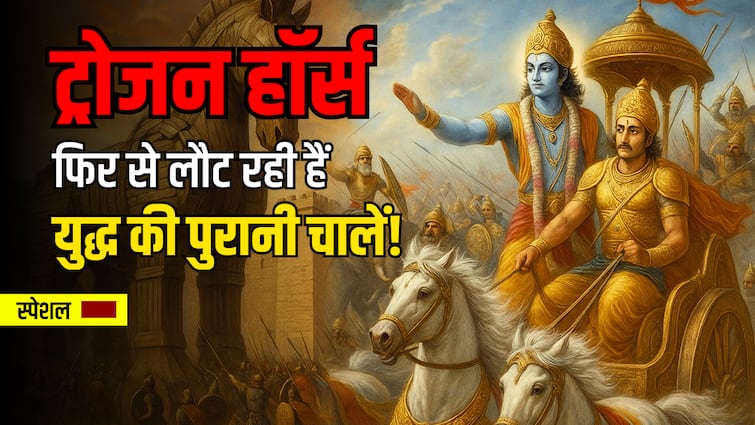Ukraine has caused great damage to Russia using the Trojan-Horse strategy, for which Ukraine started preparations months ago. Now the result is in front of the whole world. Ukraine has made a bigger attack than trucks and drones under this war strategy.
Russia (Russia) has been shaken. But do you know that the Trojan-Horse strategy is not new, there is evidence of using such a strategy even in the war of Mahabharata, you can say that Ukraine has forced Russia to think in the war by adopting the strategy that India is familiar with the strategy long ago.
What is Trojan Horse? & Nbsp;
‘Trojan Horse’ means that the enemy accepts the gift and he becomes the cause of its destruction. This war policy is inspired by the Mahabharata and the Greek epic Elliad, where the Greeks attacked the Troy Nagar by hiding the soldiers in a huge wooden horse.
In today’s era, this strategy has become even more dangerous with modern technology. On the previous day Ukraine hidden drones in trucks and attacked the airbase inside Russia which is a modern example of Trojan Horse.
What strategies were adopted in Mahabharata? It is believed that about 1 billion 66 crore 20 thousand warriors died in the Mahabharata war. 24,165 warriors have not been detected in this war. The Pandavas and 18 Akshauhini forces from the Pandavas and the Kauravas took part in the war of Mahabharata. & Nbsp;
Ashwatthama’s & lsquo; false death & rsquo; The news was the result of a treaty. In this war, Dronacharya was becoming unbeatable in war. To remove him from the war, Yudhishthira called a semi -truth which is still discussed ‘Ashwatthama killed’.
In the Mahabharata, there is a verse ‘Ashwatthama Hat: Iti Nar: Kunjaro Va’ which means Ashwatthama is killed & hellip; But elephant. But Dronacharya did not listen to this thing. He assumed that his son had been killed and he left weapons.
This deceit caused his death. Because the name of Dronacharya’s son was also Ashwatthama. Dronacharya got this confusion because he was later said by Dharmaraja Yudhishthira who is always known for speaking the truth. It was a pure mental trojan horse, where the victory was ensured by spreading confusion. The same situation was seen in Russia-Ukraine War.
Mahabharata’s Chakravyuh Policy
everyone knows about Chakravyuh that it was a complex war strategy, which was easy to enter but almost impossible to get out. Abhimanyu was not fully aware of this, yet he was sent inside.
This strategy was the Trojan style of the Kauravas, not of the Pandavas, where a warrior was implicated and passed and killed. This incident of Mahabharata states that war is won not only by power, but also by strategy.
The trick of snatching the armor-clock from Karna
Danveer Karna got armor and coil from birth as a boon, which used to make him invincible. No one could beat him. Not even the deity. Once Indradev became a Brahmin and demanded armor and coil in charity. If seen, this donation was a ‘Trojan Chal’ of a deity so that Arjuna could defeat the war of Mahabharata when the time comes.
Was these strategies scripture?
Now the question arises whether these tricks filled with deception were justified? On this, it is said in the Mahabharata, ‘Religion Rakshati Rakshit:’ means the religion of war decides its direction.
When unrighteousness increases, a device becomes religion to defeat unrighteousness. That is, when the target religion is established, the strategy even becomes the trick.
Returning again the old tricks of war!
drone attacks, cyber attacks, fake information and AI based disorder are all the appearances of modern trojan horses. The drone strategy that Ukraine adopted for the attack on Russia’s airbase is a technical glimpse of trick and skill adopted in the war of Mahabharata.
Mahabharata’s battle strategies are still alive, just the medium has changed!
Mahabharata teaches that war is not only with weapons, not only by weapons, but also by strategy, psychology and tips. It is true that today in the world, whether it is Russia-Ukraine or Cyber War, Mahabharata’s war-struggle has started to look more relevant than ever. & Nbsp;

